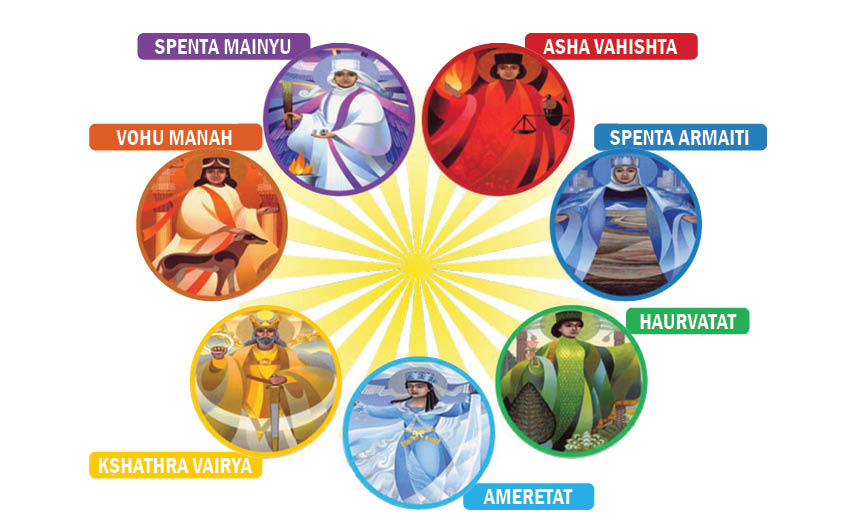Humata, Hukhta, Hvrashta
What are Asho Zarthost Paigamber’s teachings about living a virtuous life? When we talk about Zoroastrian virtues, the first thing that comes to mind is ‘Pendar Nik, Goftar Nik, and Kerdar Nik’ (Persian for Good Thoughts, Good Words, and Good Deeds), which is the prime motto of our glorious religion. As Zarthostis we try our best to practice this triad so as to fulfil the purpose of taking birth in this physical world: “Purity and Righteousness with Piety and Love induced in every Thought, Word, and Deed is the best thing in life,” Spentomad Gatha, Yasna 48.5.
While it may sound simple, it may not be easy to follow in every living moment. It is so important to be mindful of our thoughts, words and actions, because all human beings, the environment, and all of the creations of Ahura Mazda are inter-connected. Therefore, our thoughts, words, and actions affect the whole universe, including ourselves. Further, in Sarosh Yasht Hadokht 11.3, it is said, “By speaking true words we receive many victories.”

As explained in the Vispa Humata prayer, this moral triad helps one to experience paradise in this life and in the life after.
Another key principle for a Zarthosti who is a co-worker of Dadar Hormazd, is to practice, ‘Vidaevo Ahura Tkaeshō’ – that is abstaining from the path of daevas (negativity), and acting according to the law of Ahura Mazda – Āsha – with total humility, thus transforming any kind of negativity into positivity.
In order to live a virtuous life, we need to connect ourselves with divinity. In the Hormazd Khodae, we say “Taroidite Angrahe Mainyush,” meaning, may the evil mentality within us be defeated. Hence, we have to remove the Ahriman or evil from within us.
Our Kusti ritual is a cleansing ritual, which I compare to a virus scan or virus removal program. Here, I am not just talking about the physical and external cleansing, but also the emotional-spiritual cleansing that makes our hearts and minds pure. Just as we take a shower and cleanse our external body, the kusti ritual cleanses our astral body.
After performing the kusti ritual, the first prayer we recite is the 101 names of Dadar Ahura Mazda, by which we are downloading into this hardware – our body and mind – the qualities or adjectives of Dadar Ahura Mazda. Thereby, we connect ourselves with the higher consciousness, as we recite or chant the sacred mathrawani. We ask Ahura Mazda, “Express yourself through me, I am open to the flow of your spirit, fill me up with your energy, so much so that, there is no room left for anything that is less than good.” We become a magnet of goodness, only the good things come to us, and also, only good goes out of us. Thus, we truly become Dadar Ahura Mazda’s instrument!
“By working towards taking care of our environment, taking care of all creations, and helping these to flourish and renovate, we work towards Frashokereti. By doing so, once again, we are fulfilling the purpose of our birth.” – Ustavad Gatha, Yasna 46.12.
In doing good, we become immortal in this world and attain the splendid Garothman in the spirit world, says the Ustavad Gatha, (Yasna 43.1).
Asho Zarthosht Paegambar Saheb’s teachings on living a virtuous life, in the words of our prophet are expressed in Ahunavad Gatha Yasna 34.1 and Spentomad Gatha Yasna 47.1, which states: “Let us follow in the footsteps of Dadar Ahura Mazda, the way He Himself has attained immortality, through Asha (Righteousness) and Order, Kshthra (good dominion) and Haurvatat (perfection). Let us fully imbibe them in our own selves and in our own lives.”
We are spiritual beings in a physical body and as such, everything in this world possesses the divine essence of Dadar Ahura Mazda and the Amesha Spentas. Human beings are provided with free will (Ahunavad Gatha Yasna 31.11) and are encouraged to make the right choice. Again, it is mentioned in Ahunavad Gatha Yasna 30 and Ushtavad Gatha Yasna 45. – that evil is not created by Dadar Ahura Mazda, but by the wrong or bad choices made by us, bringing about chaos in this physical world.
It is our duty to ensure that we take care of our environment by making the right choices in everyday life to neutralize or remove evil and restore this world perfectly, the way it was created by Dadar Ahura Mazda – Ahunavad Gatha Yasna 30.9.
To achieve success in preserving, healing, and sustaining our environment, for the benefit of our current and future generations, we need to come together and use our good minds to form a Collective Consciousness.
In our religion, there are seven Amesha Spentas, or bounteous immortals, each having a beneficent quality and a responsibility of overlooking each of the wonderful creations of God. This heptad is also considered as the seven steps or commandments, which when followed, benefit individuals and helps to collectively bring about progress in improving ourselves and others in terms of physical and emotional health, and to bring about prosperity and happiness.
‘Spenta Mainyu – God’s will, Creator of Life and Man; Vohu Manah – the Good Mind – Cattle; Asha Vahishta – Rghteousness, Order – Fire, Energy; Khshathra Vairya – Moral strength, determination – Metal sky; Spenta Armaiti – Holy piety, love, devotion – Earth; Haurvatat – Perfection – Water; and Ameretat – Immortality – Plants’ – When we imbibe all these wonderful seven spiritual qualities of Dadar Ahura Mazda himself and practice them in our daily lives, we live a virtuous life, creating heaven on earth for us and others, thus, pleasing and strengthening our Creator by nurturing and renovating His own creations.
In conclusion, when we adopt and practice Asho Zarathost Paegamber Saheb’s philosophy in our daily lives with humility, we live a virtuous life. It is our duty particularly of recent times, when our youth are turning away from religion, because of preconceived notions of religious dogma, is when we need to explain to them this everlasting, simple yet profound message of our ancient religion.
Naroz Mubarak!

- ઉજવણીની સાચી ભાવના! - 15 March2025
- નવરોઝ અને શાહ જમશીદની દંતકથા - 15 March2025
- મારું સ્વાસ્થ્ય મારી જવાબદારી છે! - 15 March2025
